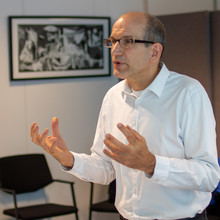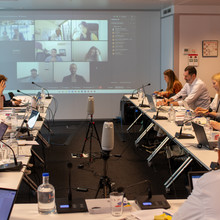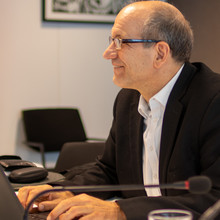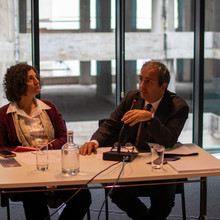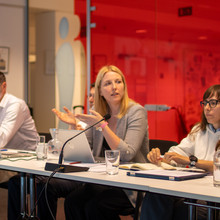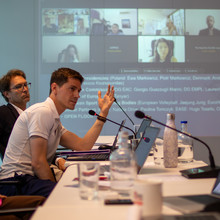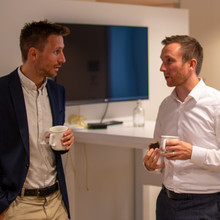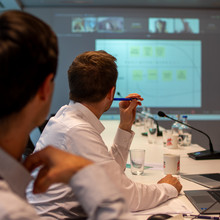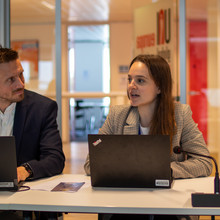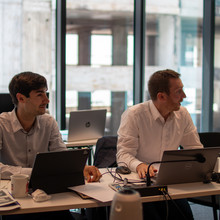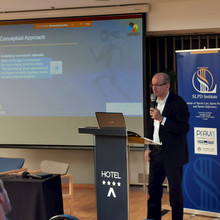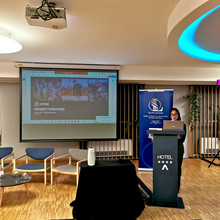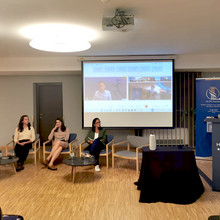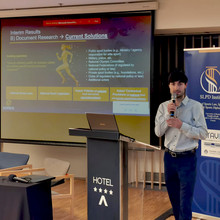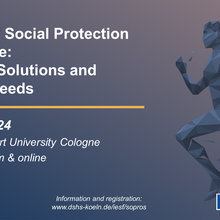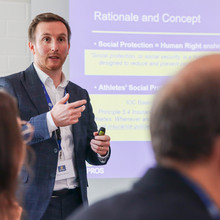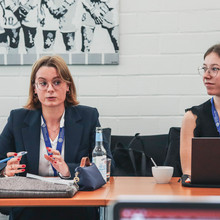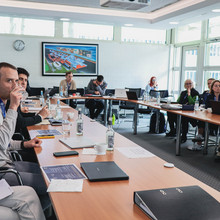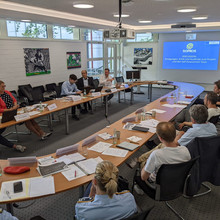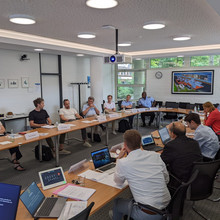SOPROS | Assessing, Evaluating and Implementing Athletes' Social Protection in Olympic Sports
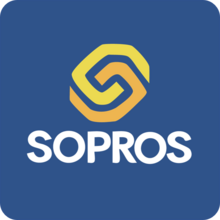
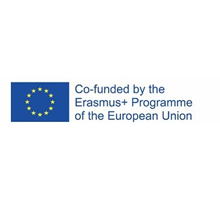
Projektteam
Projektleiter
Prof. Dr. Jürgen Mittag
Projektkoordinator
Dr. Maximilian Seltmann
Projektmitarbeiter
Lorenz Fiege M.A.
Projektlaufzeit
Januar 2023 – Dezember 2025
Projektförderung
Europäische Kommission
In den letzten Jahren haben mehrere Fälle von Problemen im Zusammenhang mit dem sozialen Schutz von Spitzensportlern Schlagzeilen in den Zeitungen gemacht und in der Öffentlichkeit ein kritisches Bewusstsein geschaffen. Leider beziehen sich diese Schlagzeilen in vielen Fällen auf tragische Unfälle von Spitzensportlern, aber auch Themen wie Rentenzahlungen, Gesundheitsversorgung oder Mutterschutz sind in den Bereich der olympischen Spitzensport-Governance gelangt. Jüngste Daten des EMPLOYS-Projekts zeigen jedoch, dass der Sozialschutz für viele Athleten im olympischen Sport auf dem ganzen Kontinent eingeschränkt ist. Die meisten auf Athleten ausgerichteten Sozialschutzsysteme beruhen auf einer Ad-hoc-Zusammenarbeit und -Koordinierung zwischen Sportverbänden und öffentlichen Behörden. Die tatsächlichen Rollen und Verantwortlichkeiten der öffentlichen und privaten Akteure bei der praktischen Umsetzung des Sozialschutzes der Athleten sind noch nicht genau definiert.
Jüngste politische Initiativen auf transnationaler und europäischer Ebene haben die Notwendigkeit anerkannt, die Sozialschutzstandards für Athleten zu erhöhen, z. B. der Europarat im Jahr 2021 und die IAO im Jahr 2020. Darüber hinaus positionieren sich die Athleten zunehmend als Hauptakteure der olympischen Bewegung und fordern eine stärkere Beteiligung an Entscheidungsprozessen, die ihr Leben sowohl als Sportler als auch als Menschen betreffen. Dies zeigt, wie wichtig es ist, alle Akteure des Spitzensports, die für die Regelung und Umsetzung des Sozialschutzes der Athleten verantwortlich sind, einzubeziehen.
Vor diesem Hintergrund zielt das SOPROS-Projekt darauf ab, Integrität und Werte im Sport zu fördern, indem der soziale Schutz der Athleten im olympischen Sport bewertet, evaluiert und umgesetzt wird. Es kann als eine Vertiefung des Erasmus+ EMPLOYS-Projekts im Bereich des sozialen Schutzes von Athleten verstanden werden, der eine der sechs Kerndimensionen der Arbeitsbeziehungen von Athleten im olympischen Sport ist. Es wird auf der soliden Grundlage und den Erkenntnissen des EMPLOYS-Projekts aufbauen und die nächsten Schritte zur Schaffung eines Rahmens für die Umsetzung konkreter Maßnahmen für Athleten im spezifischen Politikbereich des Sozialschutzes unternehmen. Dem Projektkonsortium gehören vier akademische Partner an, die sich mit der Erforschung und Untersuchung von Sport-Governance, Sportpolitik und Sportrecht befassen, sowie fünf politische Partner mit umfangreichem Fachwissen über die Beschäftigung von Athleten und soziale Beziehungen.
Zusammengefasst wird das SOPROS-Projekt:
- praktikable Selbstbewertungsinstrumente entwickeln (jeweils eines für Athleten, Sportverbände und Behörden), um eindeutige Daten über den sozialen Schutz von Athleten im olympischen Sport zu sammeln;
- diese Daten in einem Evaluierungsbericht analysieren und präsentieren;
- ein Handbuch für die Umsetzung des Sozialschutzes von Athleten entwickeln;
- einen Verhandlungsprozess im olympischen Spitzensport erproben und analytische und praktische Einblicke in dessen Vorteile und Herausforderungen geben; und
- zwei nationale Workshops, einen Multi-Stakeholder-Workshop auf EU-Ebene und drei öffentliche Konferenzen veranstalten.
Wissenschaftliche Partner
- University of Rijeka, Faculty of Law (Pravi Fakultet Sveucilista u Rijeci), Kroatien
- Sport Evolution Alliance, Portugal
- Edge Hill University, Großbritannien
- Institute for Sport Governance, Polen
Politische Interessenvertreter
- European Elite Athletes Association (EU Athletes)
- European Olympic Academies
- Association of Sport Employers, Frankreich
Verbundene Partnerorganisationen
International Labour Organization, Schweiz
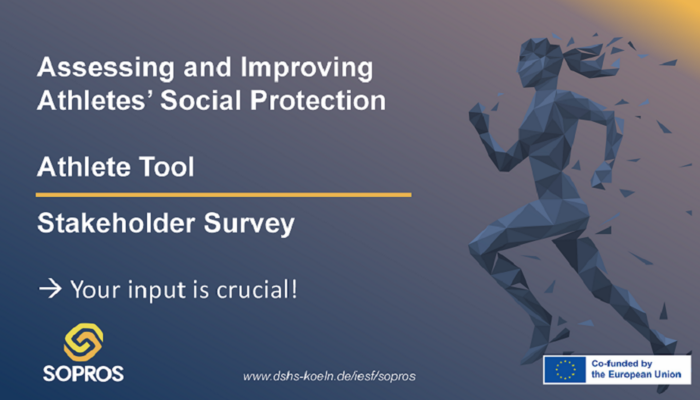
Helfen Sie mit bei der Verbesserung des Sozialschutzes von Athlet:innen im SOPROS-Projekt –
Ihr Beitrag ist zentral!
Um ein ganzheitliches Bild der aktuellen Sozialschutzsituation von Athlet:innen zu zeichnen – und beispielsweise Bedürfnisse, Risiken oder spezifische Schutzlücken zu identifizieren – sind Beiträge und Einblicke aus erster Hand von den betroffenen Athlet:innen und den beteiligten Stakeholdern (Sportvereine, -verbände, -ministerien, Athletenorganisationen, etc.) von herausragender Bedeutung.
Zwei umfassende Datenerhebungsinstrumente, die von den Projektpartner:innen in der Anfangsphase des Projekts gemeinsam entwickelt wurden, werden derzeit unter Athlet:innen und Stakeholdern aus verschiedenen Ländern und Sportarten weltweit verbreitet.
Für Athlet:innen
Unser sogenannter Athlete Social Protection Check (ASPC) ermöglicht es Spitzensportler:innen, ihre persönliche Sozialschutzsituation selbst einzuschätzen, mehr über ihre gesetzlichen und Athlet:innen-spezifischen Ansprüche zu erfahren und ihre Absicherung mit der von Athlet:innen aus anderen Ländern und Sportarten zu vergleichen. Außerdem bietet ihnen unser Global Athlete Survey-Toolkit die Möglichkeit, ihre persönliche Meinung über ihre aktuelle Sozialschutzsituation und die Verantwortung und Fürsorgepflicht der beteiligten Stakeholder zu äußern. Athlet:innen können den Athlete Social Protection Check und das zusätzliche Survey-Toolkit bis zum 15. Dezember 2024 über die neu erstellte Websiteathletes-social-protection.eu öffnen.
Für Stakeholder:innen
Unser Survey-Toolkit for Stakeholders gibt beteiligten Stakeholdern die Möglichkeit, ihre persönliche Meinung zur aktuellen Situation des Sozialschutzes von Athlet:innen zu äußern und Informationen über die Aktivitäten ihrer Organisation in diesem Bereich zu teilen. Das Stakeholder Survey-Toolkit ist hier aufrufbar und ebenfalls bis zum 15. Dezember verfügbar.
Nach Abschluss der Datenerhebungsphase und Analyse der eingegangenen Antworten wird das Projektteam hier auf dieser Website einen Überblick der wichtigsten Ergebnisse der Ermittlung und Bewertung der aktuellen Sozialschutzsituation von Athlet:innen geben und die weiteren Projektschritte skizzieren.
SOPROS EU-Level Multi-Stakeholder Workshop in Brussels
On June 26, 2025, the SOPROS project brought together over 20 high-level stakeholders from European institutions, national governments, sport organisations and athlete associations for its EU-Level Multi-Stakeholder Workshop in Brussels. One remark from the discussions captured the atmosphere of broad consensus: “I learned that you can’t be against the social protection of athletes.” Yet, as the workshop also made clear, turning this shared conviction into concrete, coordinated action across national borders remains a significant challenge. Hosted at UNI Europa in the heart of Brussels, the event provided a unique platform for open dialogue and co-creation on one of the most pressing topics in European sport governance: strengthening the social protection of elite athletes. The workshop marked an important step towards developing practical, cross-border solutions to safeguard athletes’ rights and well-being across Europe.
The SOPROS Project: Approach and Evaluation Results
The workshop began with an introduction to the SOPROS project’s core objectives and research findings. Professor Juergen Mittag from the German Sport University Cologne and the project team, Maximilian Seltmann and Lorenz Fiege, presented a comprehensive overview of the current state of social protection for elite athletes in Europe. The focus of the Erasmus+ Project lies particularly on those competing in Olympic sports outside the major professional leagues, whose athletic careers often constitute full-time commitments but are not accompanied by formal employment status or adequate legal safeguards.
The research highlights the fragmented and inconsistent landscape of athlete social protection across Europe. National approaches vary considerably, from public employment schemes within military or police forces to elite athlete status legislation and isolated, athlete-specific measures. Despite their crucial role in the European sport system, many athletes face legal uncertainty and significant gaps in access to essential social protection, such as health insurance, injury protection, unemployment or maternity support, and pension schemes. Moreover, the research findings underscore a worrying lack of awareness among athletes regarding their rights and available protections. Survey data revealed that the vast majority of athletes feel poorly informed about social protection provisions.
At the same time, the project emphasises the strong interdependence between sport governance, labour rights, and social protection. It calls for recognising elite athletes, especially those outside commercialised professional sport, as workers entitled to basic social protections under national and European legal frameworks.
For those interested, the presentation delivered by the project team at the beginning of the Round Table — providing further details on the research background, key findings and conceptual approach — is available for download under the following LINK.
Round Table: Athletes’ Social Protection – A Key Value Underpinning the European Sport Model?
The subsequent roundtable brought together policymakers, athlete representatives, and experts to explore the role of social protection within the European sport model. A key message emerged early on: while social protection is increasingly recognised in political discourse, it is not yet firmly established as a core value of sport governance in Europe.
Representatives from the European Parliament, including Pandora Dimanopoulou (assistant to MEP Nikos Pappas) and Katarzyna Biniaszczyk (assistant to MEP Bogdan Zdrojewski), outlined how athlete rights — including social protection, occupational health, and dual career support — have been given prominent attention in the forthcoming European Parliament report on the European Sports Model. This was seen as a positive signal that the political momentum for change is growing, even if the report also revealed institutional complexities, such as overlapping responsibilities between different EU institutions.
Ziya Tanyar, representing the Council of Europe, provided insights into how existing legal instruments, such as the European Social Charter, could be leveraged to advance athlete protection. Although these tools have been underutilised in the sports context so far, they offer tangible avenues for governments and stakeholders to improve working conditions, health and safety standards, and social rights for athletes.
Representatives of the current and upcoming EU Council Presidencies highlighted growing political attention to athlete protection. Piotr Markowicz and Ewa Markowicz (Polish Council Presidency) underlined that safeguarding athletes’ well-being and social rights must be a core element of the European sport model. Anders Stein Knudsen (Danish Presidency) confirmed that the issue could feature on the agenda of forthcoming Council meetings, though national discussions in Denmark remain decentralised. Vassos Koutsioundas (Cyprus Sport Organisation) shared a practical example of a national pilot scheme that provides jobs in sport federations to top athletes, supporting their social security and career transition.
With Paulina Tomczyk and Natalia Orive from EU Athletes as well as Walter Palmer from the World Players Association, athletes’ associations contributed critical perspectives, calling for stronger, independent athlete representation in governance processes. They emphasised that internal athlete commissions, while valuable, cannot replace the role of independent unions when it comes to negotiating binding improvements to social protection. The roundtable discussion made it clear that to truly embed social protection as a key value within the European sports model, more explicit legal definitions, stronger institutional cooperation, and effective mechanisms for athlete voice and representation are essential.
Interactive Session: Tools and Instruments for the Transnational Coordination of Athletes’ Social Protection – Reflections on Concrete Measures
In the second half of the workshop, participants focused on practical tools and instruments that could enhance the transnational coordination of athlete social protection across Europe. A central theme was the gap between progressive political declarations and concrete, enforceable measures that tangibly improve athletes’ lives.
Representatives from European sport federations such as Jaejung Jung from the European Volleyball Federation (CEV) and GinoSchilders from Euro Hockey shared examples of existing initiatives, including best practice exchanges, dual career programmes, and the development of common standards for athlete protection. However, both organisations pointed out that their ability to enforce binding rules on national members remains limited.
The discussion also explored broader European instruments. The potential for establishing new sectoral social dialogue committees for professional sports, beyond football, was widely acknowledged. The football sector’s successful example of structured social dialogue was seen as a blueprint for creating similar mechanisms in other sports, provided sufficient political will and stakeholder collaboration can be mobilised.
Further, the European Social Charter’s collective complaint procedure was presented as an underutilised but promising legal avenue for advancing athlete protection, with NGO and trade union involvement offering athletes formal channels to assert their rights at the European level.
Finally, participants agreed that the current political momentum, reflected in policy developments such as the European Parliament report and the growing visibility of athlete rights, presents a rare window of opportunity to advance the topic. However, to translate this momentum into meaningful change, a coordinated, multi-stakeholder approach is essential. Governments, sports bodies, athlete representatives, and EU institutions must collaborate to ensure that social protection becomes a tangible reality for athletes, rather than an abstract political aspiration.
The SOPROS project will continue to build on these discussions and work precisely at this intersection — bringing together key stakeholders, fostering dialogue, and developing practical policy solutions. The Brussels workshop marked a crucial step in this process, and all those interested can look forward to further project events as well as concrete outputs in the coming months.
“Athletes’ Social Protection in Europe: From National Practice to European Coordination?”
On 25 April, the 2nd public conference of the EU-funded “SOPROS” project took place in Zagreb, Croatia.
In the first part of the conference which was hosted under the auspices of the Croatian Ministry of Tourism and Sport, Jürgen Mittag and Lorenz Fiege presented interim project results of the ongoing evaluation of elite athletes’ social protection situation across the European continent.
Following an inspiring keynote by Croatian Olympian and Paralympian Sandra Paović on her personal social protection after suffering spinal cord injury, the first panel of the conference was dedicated to identifying good practices and key challenges in relation to the implementation of social protection measures for elite athletes at the national level.
Martina Jeričević(Croatian Ministry of Sport & Tourism), Laura Montvilaite (Lithuanian Athletes’ Ombudsperson), Milos Milenkovic (NOC Serbia), Nik Berger (KADA), and Gordan Kožulj (WC medallist and member of the Croatian Olympians Club)elaborated on specific social protection gaps and needs for elite athletes in their countries, as well as on state andnon-state actors’ responsibility and duty of care.
Eventually, as part of a second (international) panel which was stimulated by a keynote given by Erica Puppo (FIFPRO Europe) on new maternity rules in football, Deena Blacking (The Cyclists’ Alliance), Simona Kustec (former Slovenian Minister of Sport), Walter Palmer (co-founder of World Players’ Association and European Athletes and Players Association) and Erica Puppo discussed about the potential for enhanced transnational (European) coordination. The panellists shared their different viewpoints on whether (and how) elite athletes’ social protection should be specified and leveraged as a key feature of the European Sport Model. They, furthermore, explored to what extent forms of social dialogue and collective negotiation may serve as effective tools to raise and harmonise social protection standards for elite athletes across sports and countries.
Related discussion and debate, as well as specific (new) issues arising from the conference conduct will be deepened and addressed in the scope of an EU-level Multi-Stakeholder Workshop on 26 June in Brussels.
Meanwhile, the project team calls on all elite athletes and stakeholders to express their personal and organisational viewpoints on matters of elite athletes’ social protection via two dedicated survey-toolkits:
- Athletes: ww2.unipark.de/uc/SOPROS_athletes_country_ASPC/
- Stakeholders: ww2.unipark.de/uc/SOPROS_stakeholders/
Rückblick
Vom 8.-9. April 2024 begrüßte das SOPROS-Projektteam Interessenvertreter aus einer Vielzahl von Ländern und Organisationen zur ersten öffentlichen Konferenz des Projekts. Die Veranstaltung mit dem Titel "Athletes' Social Protection: Current Solutions and Future Needs" (Aktuelle Lösungen und zukünftiger Bedarf) brachte Experten und Interessenvertreter aus Sportverwaltung, Politik und Wissenschaft zusammen, um die verschiedenen Ansätze und den zukünftigen Bedarf an sozialem Schutz für Sportler in den europäischen Ländern zu diskutieren.
Die Konferenz begann mit einer Einführung von Professor Jürgen Mittag in das Thema der Rechte und des Wohlergehens von Sportlern sowie in den Hintergrund und den Kontext des SOPROS-Projekts. Maximilian Seltmann, Lorenz Fiege und Jennifer Edwards gaben anschließend einen kurzen Überblick über die Ziele und Zwischenergebnisse des SOPROS-Projekts und stellten die Self-Assessment Tools und Toolkits für Athleten und Stakeholder vor, die darauf abzielen, den aktuellen Stand der nationalen Gesetzgebung und Politik zum Schutz der Athleten im olympischen Sport vor sozialen Risiken systematisch zu bewerten. Die nächsten Schritte des SOPROS-Projekts, einschließlich der Einführung der Tools und Toolkits, der Datenerhebungsphase und des künftigen Evaluierungsberichts, wurden ebenfalls erläutert und die nächste Konferenz in Kroatien im April 2025 angekündigt.
Anschließend leitete Elodie Mangez von der European Association of Sport Employers ein Panel mit dem Titel "Lösungen und Bedürfnisse auf nationaler Ebene". Vertreter der deutschen Bundeswehr, unabhängiger Athletenverbände (Athleten Deutschland, Union Nationale des Sportifs de Haut Niveau) und der Nationalen Olympischen Komitees von Belgien, Kroatien, Deutschland und Portugal stellten jeweils die Rolle ihrer Organisation bei der Unterstützung von Spitzensportlern vor und erläuterten, wie sie zur Entwicklung und Umsetzung von Sozialschutzmaßnahmen für Spitzensportler beitragen. Die Diskussionsteilnehmer erörterten auch, welche Sozialschutzmaßnahmen für die Gewährleistung der Sicherheit von Athleten während und nach ihrer Karriere am wichtigsten sind, welche anderen Akteure ihrer Meinung nach eine wichtige Rolle bei der Förderung des Sozialschutzes für Athleten in ihren Ländern spielen sollten und welche Rolle transnationale und internationale Einrichtungen bei der Koordinierung und Förderung von Sozialschutzinitiativen für Athleten spielen könnten.
Nach dem Mittagessen gab Professor Vanja Smokvina von der Universität Rijeka einen Überblick über den sozialen Dialog im Sport auf europäischer und globaler Ebene und darüber, wie dieser als Instrument zur Verbesserung des Sozialschutzes von Sportlern dienen kann. Professor Smokvina erörterte auch die mögliche Zukunft von Mindestarbeitsnormen im Sport und betonte die Bedeutung von Koordinierung und Zusammenarbeit bei der Arbeit an dieser Zukunft.
Den Abschluss des Tages bildete eine Podiumsdiskussion mit dem Titel "Transnationale Perspektiven für den Sozialschutz von Athleten", die von Anna Semenova von EU Athletes geleitet wurde. Vertreter der IAO, der World Players Association und der Europäischen Olympischen Komitees präsentierten, inwieweit ihre Organisationen an der Entwicklung, Koordinierung oder Umsetzung von Sozialschutzmaßnahmen für Spitzensportler beteiligt sind, und bewerteten die Möglichkeit einer länderübergreifenden Koordinierung und Harmonisierung des Sozialschutzes von Sportlern.
Die erste SOPROS-Konferenz war eine wertvolle Quelle für Informationen und Details über die aktuelle Landschaft des sozialen Schutzes von Athleten in Europa, und wir sind allen Diskussionsteilnehmern und Teilnehmern sehr dankbar, die uns sowohl in Köln als auch online besucht haben, um ihre Organisationen vorzustellen, ihre Erfahrungen aus erster Hand zu teilen und wichtige Fragen zu stellen. Dieser Beitrag hilft dem SOPROS-Projekt, seinem eigentlichen Ziel näher zu kommen: Integrität und Werte im Sport zu fördern, indem der soziale Schutz der Athleten im olympischen Sport bewertet, evaluiert und umgesetzt wird.
SOPROS ist ein Erasmus+ Projekt und läuft von Januar 2023 bis Dezember 2025. Das SOPROS-Projektteam umfasst sowohl akademische als auch politische Partner und setzt sich aus der Deutschen Sporthochschule, der Edge Hill University, der Universität Rijeka, dem Institute for Sport Governance, der Sport Evolution Alliance, EU Athletes, dem Europäischen Verband der Sportarbeitgeber, den Europäischen Olympischen Akademien und der Internationalen Arbeitsorganisation zusammen.
Zagreb, Kroatien, 21.11.2023
On Tuesday, 21 November 2023, a workshop on the social status of athletes in Olympic sports was held at the headquarters of the Croatian Volleyball Federation in Zagreb. The workshop was organised by the University of Rijeka, Faculty of Law and its Centre for Sports Law, Sports Policies and Sports Diplomacy - the head of the centre and regional coordinator of the project, Assoc. Prof. Vanja Smokvina.
Participants included Tomislav Družak, State Secretary of the Ministry of Tourism and Sport of the Republic of Croatia; Josipa Klišanin, Head of the Labour Sector at the Ministry of Labour, Pension System, Family and Social Policy of the Republic of Croatia; Biserka Vrbek, prof. Romana Caput Jogunica and Snježana Pejčić on behalf of the Croatian Olympic Committee along with Blanka Vlašić, President of the NOC of CRoatia Athletes' Commission; Frane Žanić, President and Valentina Bifflin, Director of the Croatian Volleyball Federation; Zoran Primorac, President of the Croatian Table Tennis Federation; Luka Jakovčev on behalf of the Croatian Water Polo Federation; athlete Bruno Erent on behalf of the Croatian Athletics Federation; Mario Jurić, President of the Croatian "Football Union"; Marija Anzulović on behalf of the Croatian Olympic Club; Suzana Šop, Secretary General of the Sports Association of the City of Zagreb and Katja Luketić, Secretary of the Sports Association of Primorje - Gorski Kotar County.
The aim of the workshop was to present the SOPROS project to sports stakeholders and athletes, discuss the issue of social and legal status of athletes in Olympic sports in the Republic of Croatia and present the self-assessment tools that the project team members will use to collect data from sports stakeholders in order to draw their conclusions and proposals for improving the status of athletes at the level of the European Union and Member States with the support of partners - the International Labour Organisation (ILO), EU Athletes (Athletes' Associations); EASE (Association of Employers in Sport) and the European Olympic Academies as project partners.
Edge Hill, United Kingdom - 16.11.2023
Lissabon, Portugal - 20.10.2023
Warschau, Polen, 04.10.2023
Am 21. Juni 2023 trafen sich zum ersten nationalen Workshop des SOPROS-Projekts elf Akteure aus der deutschen Sportlandschaft an der Deutschen Sporthochschule Köln. Ziel war zum einen der Austausch der Teilnehmer*innen über die soziale Absicherung der deutschen Spitzensportler*innen im olympischen Sport, zum anderen die Präsentation der entwickelten Self-Assessment Tools sowie das Sammeln von dazugehörigem Feedback und Kommentaren. Die Gruppe bestand aus Vertreter*innen der Bundeswehr, des Deutschen Olympischen Sportbundes, des TSV Bayer 04 Leverkusen, des Athleten Deutschland e.V., der Staatskanzlei NRW, des Olympiastützpunktes Köln, des Freiburger Kreises und des Leichtathletik-Verbandes Nordrhein.
Den Teilnehmer*innen wurden zunächst die Struktur und der Zeitplan des SOPROS-Projekts vorgestellt. Außerdem wurde Ihnen eingangs das Projektziel, die soziale Absicherung der Athlet*innen zu bewerten, nahegebracht, um etwaigen ungedeckten Bedarf aufzudecken und mögliche politische Empfehlungen diesbezüglich zu erarbeiten. Es folgte eine lebhafte Diskussion darüber, welche Art von Aktivitäten im Bereich der sozialen Absicherung ihre Organisation derzeit durchführt, wie sie die aktuellen sozialen Absicherungsmaßnahmen für Spitzensportler*innen im olympischen Sport in Deutschland einschätzen, welchen konkreten Bedarf sie sehen und welche Debatten rund um das Thema bereits geführt werden.
Nach einer kurzen Kaffeepause wurden den Workshop-Teilnehmern und Teilnehmerinnen die entwickelten Self-Assessment Tools präsentiert - ein Tool für Athlet*innen und ein Tool für Interessenvertreter*innen - und das Gesamtkonzept sowie das Back-End-Design jedes Tools erläutert. Die drei Komponenten - der Anspruch der Athlet*innen auf gesetzliche und athletenspezifische Sozialschutzmaßnahmen, die Bereitstellung athletenspezifischer Maßnahmen und die Wahrnehmung des Sozialschutzniveaus durch die Athlet*innen - wurden eingehend erläutert. In einer zweiten Diskussionsrunde wurden die Teilnehmer*innen um ihr Feedback und ihre Kommentare zum potenziellen Wert der Tools und ihrem beabsichtigten Ergebnis sowie zu möglichen Herausforderungen bei der Erstellung und Umsetzung der Tools gebeten.
Beide Diskussionsrunden erbrachten wertvolle Informationen über die aktuellen Herausforderungen und zukünftigen Möglichkeiten im Bereich des Sozialschutzes für Spitzensportler*innen im olympischen Sport. Das Feedback der verschiedenen Interessengruppen wird zweifellos eine hervorragende Grundlage für die nächsten Schritte des SOPROS-Projekts bilden.
